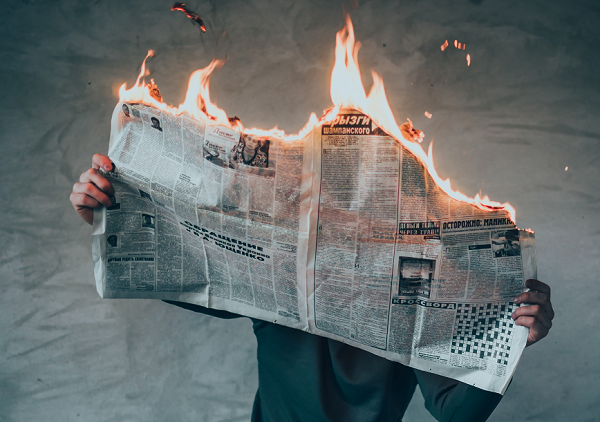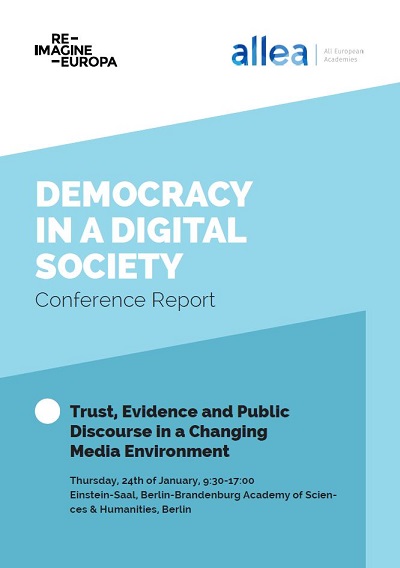Understanding public discourse and trust in a digital society
In a context where citizens struggle to distinguish facts from fabricated claims online, scientists, policymakers and media face similar dilemmas. The digital revolution is disrupting the norms and mechanisms of the public debate where they participate and of the public trust that they need to operate. A new report published by ALLEA and Re-Imagine Europa examines this changing communications environment and its effects on Europe’s value-system and democracy.
The report compiles the key takeaways of the conference ‘Democracy in a Digital Society: Trust, Evidence ad Public Discourse in a Changing Media Environment’ hosted by the Berlin-Brandenburg Academy of Sciences and Humanities in Berlin on 24 January 2019.
The forum brought together academic knowledge, media expertise and policy experience in a series of multi-stakeholder panels and workshops. The report collects the insights of these discussions, including contributions from the now European Commissioner for Innovation, Research, Culture, Education and Youth Mariya Gabriel and the President of Re-Imagine Europa and former French President Valéry Giscard d’Estaing.
Taming the digital revolution?
The starting point of the report is a call for identifying the opportunities and threats of the third revolution of communications technologies. From a historical perspective, the stakes are high. “While it took two-thousand years to tame writing, it only took two-hundred years to tame printing, resulting in the flourishing of the Enlightenment”, warns ALLEA President Antonio Loprieno.
“New technologies have repeatedly disrupted established cultures of communication. It took two-and-a-half centuries to get the culture of copyright, the laws of defamation, the conceptions of intellectual property, that reconciled – to some extent – what was done by the arrival of printing”, adds Philosopher Onora O’Neill, Fellow of the British Academy and Co-chair of the ALLEA Working Group Truth, Trust and Expertise.
Against this background, the report explores the political distress that digital disinformation and artificial intelligence may be able to inflict on European values and democracy. Commissioner Gabriel argues for “a digital future where core European values, such as freedom of expression, privacy, democracy and data protection, are fully respected”.
The reconciliation of European values with technological change is a recurring issue in this conversation. New institutions and a rethinking of our legal framework are needed to ensure that online data-based business models thrive for the benefit of society, experts agree. From a media perspective, some first principles to enable a healthy public discourse are proposed by Christophe Leclercq, Executive Chairman at the Euractiv Foundation: “Avoid censors. Dilute fake news. Promote quality content”.
Next steps
This report closes the final stage of the ALLEA Working Group Truth, Trust and Expertise, whose findings were also explored in three discussion papers: ‘Loss of Trust in Expertise? Loss of Trustworthiness? Truth and Expertise Today‘, ‘Trust Within Science: Dynamics and Norms of Knowledge Production’ and ‘Trust in Science and Changing Communication Landscapes’.
To continue this programme of action, ALLEA is now involved in the international research project PEriTiA (Policy, Expertise and Trust in Action). Funded by the EU research and innovation programme Horizon 2020, the project investigates the conditions under which citizens trust or distrust expertise used for public policy.
Picture credit: Elijah O’ Donnell




